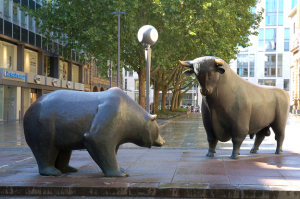 Spotting marketing trends can give your company a competitive advantage.
Spotting marketing trends can give your company a competitive advantage.
That’s because trends can show where opportunities are emerging and where possibilities are becoming more limited.
The timing of when you enter a market can affect how much money you can earn or lose. This is why learning a thing or two from day trading can help you become a smarter marketer.
Revealing the Secrets of Day Trading
Day Trading is a profession in which you buy and sell investments based on its market positions. Day traders usually hold onto the investments for a short period, sometimes only a few hours.
According to the Online Trading Academy, there are five basic rules to become a successful day trader.
These rules include:
- Look for scenarios when supply and demand are severely imbalanced to enter the trade.
- Always know your target price before you trade.
- Focus on a minimum of a 3:1 risk-reward ratio when you target your price.
- Remain patient.
- Be disciplined.
The wisdom here involves the integration of the economic law of supply and demand and the psychology that underlies emotional impulse.
It seems that as supply is reaching an end point, some buyers will continue to bid higher prices. Yet when there is an overwhelming supply and few buyers, prices decline.
These two turning points are when you can make or lose a lot of money, depending if you are selling or buying.
By knowing in advance how much you are willing to risk and how much profit is acceptable, you can set limits to when you will no longer sell or buy. Plus, investing in trades where you can earn a minimum of three times your investment makes it worth the risk you are taking. However, entering a trade where your upside is below 3:1 is too risky and the upside is too low.
Contrary to their title, day traders do NOT trade every day. They remain patient until the right opportunity comes along. Plus, day traders stay disciplined according to their plans of action, without letting the market or their emotions lead them astray. After all, greed and fear are the two biggest emotional forces they must contend with.
Greed and fear are also emotional forces that affect marketers when developing and executing marketing strategy. Generally, there are four stages in a market that can affect your success or your failure.
First Mover Advantage
First mover advantage is often a strategy that very successful entrepreneurs use to attain enormous wealth. The premise is simple. Develop an innovative product or service that fills a big unmet need in the market and be the first to deliver it. Using this early market position, the first mover can acquire a temporary monopoly position in their niche, gain market share and earn high profit margins.2
Genentech was the first biotechnology company to deliver a product to the market. Founded in 1976 by venture capitalist Robert A. Swanson and biochemist Dr. Herbert Boyer, Genentech pioneered the use of recombinant DNA technology to produce commercial medicines.3 Their first developed product was a synthetic form of insulin, the hormone that diabetics either cannot produce or make in low quantities. Today, Genentech makes an array of biotechnology therapeutic products that treat cancer, viral and other immunological disorders, eye diseases and other medical conditions. They currently sell 35 FDA-approved medicines in the market.
Other companies that have capitalized on their first mover competitive advantage include:
- Intel microprocessor
- Xerox, plain-paper copier
- Chrysler Corporation, minivan.
- MTV, continuous music videos
- McDonald's, fast-food hamburger restaurant
- Lever Brothers, Wisk liquid laundry detergent
- Cable News Network, 24-hour televised news
- Procter & Gamble, Pampers disposable diapers
- Federal Express, affordable overnight delivery of packages
However, not all first movers use their advantage and as a result, do not capitalize on the opportunity, leaving room for competitors to enter the market. An example is Mobil Chemical Company when, in the 1980s, it pioneered the coated packaging films that snack food companies use to wrap candy bars and potato chips. Mobil acted too slowly out of the gate and could not sustain its profits.
Riding the Market Wave to Maximize Your Revenue Potential
The second wave of Internet related companies, such as Google and Facebook, have made boatloads of money. These companies rode the market wave as demand was growing stronger, passing their predecessors behind. Companies that started after the wave slowed down, such as Bing and Ping, have had to invest more dollars with lower profits. Apple discontinued Ping in 2012.
Google Usurps Yahoo as the Leader in Search Engine Optimization
Archie, Turbo Gopher, V-Lib, Excite, Worldwide Web Wanderer, ALIWEB, Primitive Web Search, Infoseek, AltaVista, WebCrawler, Lycos and Yahoo! are among the search engine services that started before 1995, a time when there were not many users of the Internet. Yet, as the demand for Internet use increased and more companies developed their first websites, Google came along and rode the market wave. As demand for Internet searching increased, Google’s services became more popular and its sales and profits soared. Many of its predecessors are either not big players in the market, have been acquired or are no longer in business.
Facebook Rapidly Gains Popularity While Leaving Friendsters and MySpace Behind
Friendster, one of the first social networking websites, opened to the public in the U.S. and grew to 3 million users in three months. Shortly after, My Space started their social media service. It was Facebook, however, that followed the trend early and is the one that is the leader today.
Beware of the Crowd
A competitively crowded industry shows that demand exists in a viable market. The riskiest time to enter a new market is when too many of your competitors rush in. This “follow the herd” approach is tempting but has grave pitfalls. Just because the industry appears to be successful and is recording record sales does not mean your company will capitalize.
Think about what happened when Xerox entered the desktop computer industry. The demand for computers was still growing, but Xerox had to invest too much to create a brand that stood out from its competitors.
The key to business success isn't finding an empty field, but defining your company narrowly—no matter how crowded a marketplace you're entering.
The best way to enter a crowded market is to look for industry change and act. Yet, when the change occurs, you may have a short window of time to act to capitalize on the opportunity. If you are not ready to act, it may be best to control your impulses and wait until another change comes along, no matter how long that opportunity may take.
Late Adopters Invest in a Mature Market
When you arrive too late, you enter the market when your competitors have already established their brands. Would you invest in the railroad today compared to in 1825? Would you invest in a new automobile brand today compared to the time Ford began its automobile production?
Investing in a mature market is perhaps the riskiest of all four market stages. To make money you need to identify a very specific niche where there is an already high demand, but the current suppliers are not fulfilling. If you have a revolutionary technology that can reduce the buyers’ operating costs, then it might be worthwhile to consider investing at this time. However, if you are investing in a market at this stage of its cycle because the category involves a high amount of sales, then chances are you’ve arrived too late.
“One flop can jeopardize the very existence of small and medium-sized firms.”
Late timing can lead to disaster for companies and brands. Think about what happened after Microsoft entered the entertainment product market with X-Box, long after Sony introduced PlayStation. What about Volkswagen’s entry of the GolfPlus?
Are You Ready for the Next Market Wave?
Improving your day trading skills can help you enhance your strategic insight for spotting market trends and new opportunities. There’s bound to be a new wave of growth in your industry. The key is to enter at the right time.


Submit a Comment
Your email address will not be published. Required fields are marked *